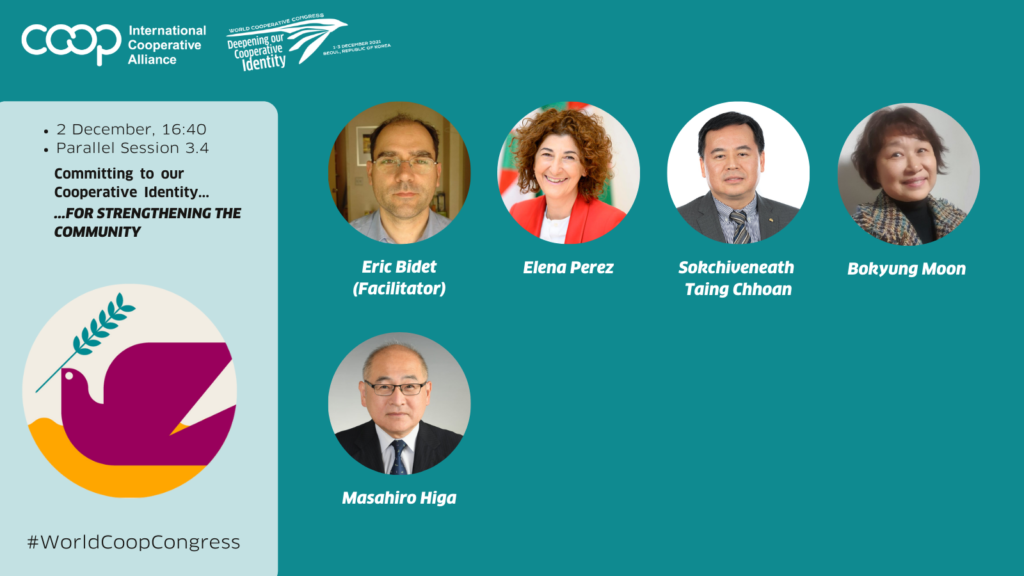
Case studies from around the world were presented to a parallel session on committing to our cooperative identity for strengthening the community at the Congress.
Bokyung Moon, Director of the Social Economy Center of Korea’s Gyeonggi province, said her organisation supports the establishment of new social enterprises and fosters social economy experts by providing training for government workers, along with programmes to enhance youth participation.
Gyeonggi has the highest number of social cooperatives in the Republic of Korea; they are active in sectors such as housing and care. The Centre works with the government to develop the social economy, she said.
School cooperatives and social cooperatives have made important contributions to rural areas of Gyeonggi province – constructing hospital services, driving the transition to sustainable food and fostering the region’s first citizen-owned solar energy plant. And social housing cooperatives are being created in response to growing difficulties in the housing market.
These measures are helping to foster a circular economy system, she said.
Elena Perez, Deputy Minister of Labor and Social Security, Basque Government, Spain, said her role includes regulation of the social economy and the labour market in the autonomous region.
Issues range from a significant unemployment rate – although it is one of the lowest in Spain. The development of an economy based on small cooperatives fostering technological innovation has been very important in a region whose traditional industries have been in decline.
The region has 1,744 cooperatives, employing over 53,000 workers; 13% of Basque industry is cooperative, with a high levels of export and innovation.
It also outperforms the national average on the Gini coefficient of inequality, which “for us, is key. We want social cohesion and equality among the population. This is not only a social value, but also an economic value.”
Sokchiveneath Taing Chhoan, Senior Manager, Socio-Economic Development, Canada, gave a presentation on the cooperative sector in Nuvanik, the northernmost region of Quebec. The sector has been crucial for indigenous communities, he said; there are 14 Nuvanik cooperatives with over 11,000 members and 11,000 employees, active in hospitality and tourism, the arts, construction, retail – with a general store in every village – and transport.
In the past five years the cooperative movement has delivered CA$30m in returns to members, $67m in returns to cooperatives and communities, and fostered a sense of ownership which underpins the region’s socioeconomic development.
“The cooperative business model was promoted as an ideal instrument of transition because it was designed to empower economically vulnerable people through alliances and because its values were in harmony with those of the Inuit, notably the values of collaboration and autonomy,” he said.
The success of cooperatives “showed that Inuit were ready to own and control their own business …a significant step to reclaiming autonomy,” he added.
Initiatives include work on the renewable energy transition, a CA$15m education fund fund, a $1.5m heritage fund, and a cooperative fund to make up for the lack of insurance provision in northern Canada.
Masahiro Higa, Senior Managing Director of Japan Cooperative Alliance (JCCU), said his organisation was established in April 2018 and comprises 600 organisations.
Japan has no common law covering all cooperatives, leading to the rise of different cooperative sector bodies in the country. JCCU is a loosely linked body created to bring these together, and is campaigning for a national cooperative law.
It is working with the cooperative movement to tackle issues facing communities in Japan – declining birth rates, ageing and shrinking populations, and inequality. “In some cases, the very existence of the community itself is at stake,” he warned. “The sustainability and revitalisation of a community where members live and work, and which is the foundation of cooperatives’ business and activities is essential.”
Principle 6 – cooperation among cooperatives – is a vital tool in this process, he said. For example, Covid-19 wiped out students’ part time incomes in the hospitality sector. To help them, regional cooperatives and agricultural cooperatives worked with student cooperatives to provide food and work opportunities. This was motivated by meeting social need rather than generating profit – and has in turn fostered a desire to help others among grateful students. This is crucial in a country with an ageing population and weakening social ties, where new systems of mutual help are being developed.
People in rural mountainous areas are also being given support in setting up mutual stores and community gardens – “a crucial element to the renewed success of these areas”, said Mr Higa.
